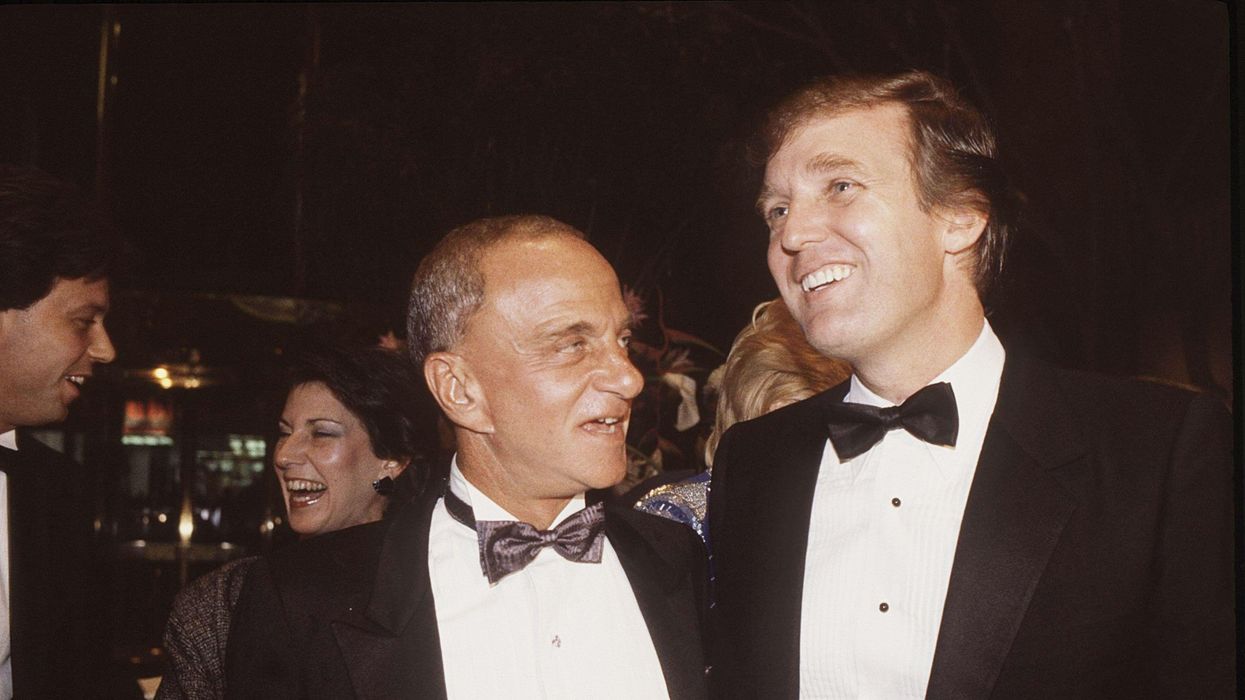
Roy Cohn, left, and Donald Trump in 1982
The magnitude of former President Donald Trump's crimes against the American Republic comes into sharper focus with daily revelations of his plot to overturn the 2020 election. His latest attempt to intimidate prosecutors and congressional investigators with barely cloaked incitements to violence at a rally last weekend — like the bluster of a mob boss facing justice — reveals his consciousness of guilt.
Strangely, to a handful of remaining apologists, Trump's endless repetition of disproved lies about voter fraud raises a whisper of doubt. If he believes his own fantastic absurdities, they say, was he really guilty of subverting the constitutional process? Or was he sincerely pursuing remedies, however twisted, to what he truly perceived as an unfair outcome?
To anyone who recalls Trump's political and moral education under the tutelage of the late Roy Cohn, mouthpiece for demagogues and mobsters, such quibbles are beside the point. Cohn cheated the government, swindled his clients and lied to the courts. His only worry was whether he could escape sanctions for his misconduct. That was why Trump plaintively cried out during the early days of the Russia investigation, "Where is my Roy Cohn?" He expected the attorney general and the FBI director to behave like his crooked lawyer and model.
Cohn might be pleased, from wherever his shade may reside, to see that some still feel obliged to offer up excuses and alibis on behalf of his infamous client. Not long ago, a law professor went on television to suggest that Trump might not be liable for his corrupt attempt to influence Georgia officials and reverse the actual outcome of the 2020 election in the Peach State. Why? Because he had tweeted about his conversation with Georgia Secretary of State Brad Raffensperger and thus had revealed the evidence cited against him. If his intentions were truly nefarious, this logician stated, he would never have disclosed his contact with Raffensperger.
The problem with the professor's theory is the usual problem involving Trump: the facts. So, in fact, Trump brazenly lied about his discussion with Raffensperger. Obviously, he didn't know that the Georgia Republican had recorded their call and, even more unfortunately for Trump, would release the recording in response to Trump's falsehoods. As Raffensperger later explained, "It was a private conversation as far as I was concerned, and he broke privacy when he put out a tweet. But then his tweet was false."
Trump claimed that during the hour-long call, he had confronted Raffensperger with evidence of rampant fraud that the secretary of state failed to answer. But, in fact, Trump could offer no such evidence, and instead threatened Raffensperger and his counsel while demanding that they "find" the exact 11,780 votes he needed to win the state.
Rather than evidence of Trump's benign intentions, this mind-boggling conversation and his subsequent lying tweet stand as proof of the state of mind known in law as "mens rea": the knowledge of wrongdoing that defines criminality. Nearly everything Trump has done over the past year, and especially as the prospect of accountability looms over him, must be viewed through that lens. Then the clarity of his criminal intent keeps getting brighter and bolder.
When Trump proclaims that if elected again, he will pardon the hundreds of vandals and thugs who attacked the Capitol to advance his coup on Jan. 6, 2021, he is telling them to keep quiet. That was precisely what he did by dangling (and then delivering) pardons to Paul Manafort, Roger Stone, Mike Flynn and others who might have testified against him in the Russia investigation. Obstructing justice by abusing the pardon power is what ultimately frustrated Robert Mueller's investigation into Trump's Russian ties. It is a sure sign of guilt, not innocence.
Knowing what's in the heart or mind of another person is uncertain, yet motive is necessary to establish in assessing the culpability of criminals. Trump's arrogance constantly reveals his sense of impunity and shows us time and again the evidence of his culpability in some of the greatest crimes this country has ever seen. We must heed his confessions and hope that Attorney General Merrick Garland acts accordingly.
To find out more about Joe Conason and read features by other Creators Syndicate writers and cartoonists, visit the Creators Syndicate website at www.creators.com.
- Compare Biden's Minor Slip With These 10 Trump Gaffes - National ... ›
- How Trump Created The 'Border Crisis' — And How Biden Can Fix It ... ›
- Trump Children Refusal To Pay Bills Results In Investigation ... ›
- Trump Flushed Documents Down White House Toilet - National Memo ›
- Reel Owns Trump Hypocrisy On Attacking Hillary On Documents - National Memo ›
- , Garland Vows Not To Sidestep ‘Political’ Cases Like Trump - National Memo ›
- Thank God Trump Isn’t President Right Now - National Memo ›
- Trump Admits He Lost During Wild Interview With Historians - National Memo ›
- Danziger Draws - National Memo ›
- Unrepentant Trump Justifies His Inaction During Capitol Attack - National Memo ›
- Trump Coup Lawyer Still Trying To Overturn 2020 Election - National Memo ›
- Poll: Americans Want Trump Held Legally Accountable For His Crimes - National Memo ›
- Secret Service Leads Federal Effort To Thwart Another January 6 Assault - National Memo ›
- Trump's Sense Of Impunity Killed Renee Good And Alex Pretti -- And Will Kill Again - National Memo ›
- Pursuing 2020 Conspiracies, Trump Sends FBI To Raid Georgia Election Site - National Memo ›








